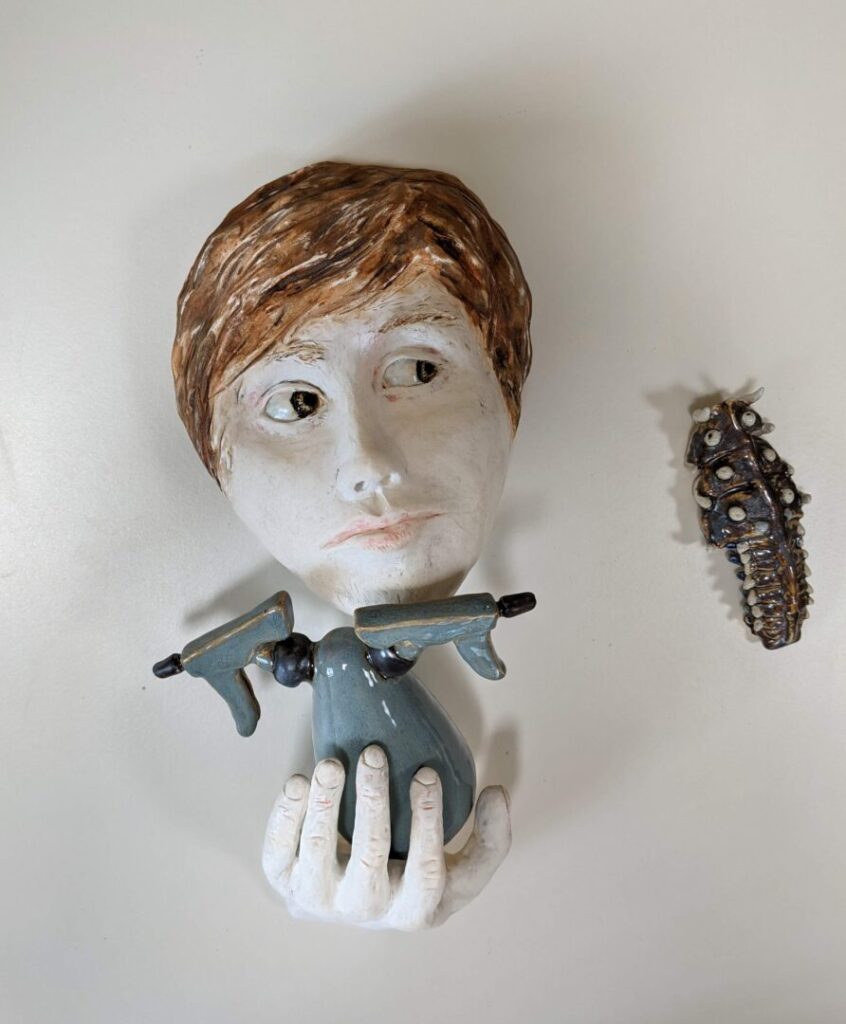Mick’s Poem
I’ve been down this road before,
Dodging threats no one can see.
“Don’t touch your face!”—who would do?
“Wash your hands!”—I’ve done too much.
To cross the street when passing
Just feels natural; to see
My neighbors doing so does not.
Why’s everybody angry? This is life!
1919 was only days ago,
And cholera and smallpox were much worse.
Lurid scenes on news broadcasts,
Numbers tossed about.
Shuttered schools and businesses—
There’ll be a price, no doubt.
Although I must admit, I wouldn’t stay
Before thirty-some students now,
Confined within a bungalow all day.
I know some folks who won’t admit it’s real
And others who feel sure they’ll die of this.
I tell them—just be careful,
Heed me well: this isn’t my first rodeo.
Context
Our Thoughts is a collaboration between Mick Jones, the alias of someone who has obsessive-compulsive disorder (OCD), and Dana Fennell, a sociologist. It includes a poem and sculpture.
Mick has had OCD since age 5 and it colors his worldview. His obsessions and compulsions have taken different forms and include thoughts and rituals related to contamination. When he was young, one of his fears was that an insect was cavorting in his nose and he would repeatedly wash his nose at the drinking fountain at school. One of Mick’s responses has been to use water on his contamination fears. He carries a spray bottle of water in his car, and quips that for him spray bottles are like the wipes the character Monk carried and regularly employed to clean, in the television show by the same name.
The fears of people with OCD vary by historical period,1 and in the past people had obsessional fears about issues of their time such as the plague.2 Research has indicated living during the COVID-19 pandemic has affected those with OCD and has been associated with a worsening of some people’s symptoms.3 However, Mick’s anxiety during the pandemic has not been extraordinary, merely noticeable. He recognizes that he has two advantages in this regard: OCD and degrees in biological sciences. As others wrangled with how to protect themselves from COVID-19, it was easy for him to eschew touching his face, to remember to wash whatever hand touched public surfaces, and to avoid people on the street. He understands how viruses work and the dynamics of their spread and die-off.
As a researcher, Dana has studied people’s lived experiences with OCD and representations of the disorder in the public sphere.4 Mick and Dana have been discussing public perceptions of OCD for more than fifteen years. Therefore, they decided to collaborate on this interdisciplinary representation of OCD during the pandemic.
The poem and sculpture highlight the impact of society on our doubts and fears, especially their cyclical features. The poem was written by Mick and draws connections between the past and present, providing his thoughts on contamination and his advice for others during the pandemic. As the pandemic has worn on, Mick has received remarks from family. One commented, “Now we’re all like you.” Another said, “I understand that now you feel vindicated.” Rather than feel vindicated, it is more that he is not terribly surprised. The sculpture is constructed by Dana and designed collaboratively, founded on their conversations. One side of the spray bottle points to Mick’s contamination fears of the past. The other side points off into the distance, representing our fears about the future.
Notes
- Patricia Friedrich, The Literary and Linguistic Construction of Obsessive-Compulsive Disorder: No Ordinary Doubt (New York: Palgrave Macmillan, 2015), 29–66. ↩
- S. Rachman and Ray J. Hodgson, Obsessions and Compulsions (Englewood Cliffs: Prentice-Hall, 1980), 22–25. ↩
- Vahid Khosravani, Frederick Aardema, Seyed Mehdi Samimi Ardestani, and Farangis Sharifi Bastan, “The Impact of the Coronavirus Pandemic on Specific Symptom Dimensions and Severity in OCD: A Comparison before and during COVID-19 in the Context of Stress Responses,” Journal of Obsessive-Compulsive and Related Disorders 29 (2021); J. B. Nissen, D. R. M. A. Højgaard, and P. H. Thomsen, “The Immediate Effect of COVID-19 Pandemic on Children and Adolescents with Obsessive Compulsive Disorder,” BMC Psychiatry 20 (2020). ↩
- See www.danafennell.com and Dana Fennell, The World of Obsessive-Compulsive Disorder: The Experiences of Living with OCD (New York: NYU Press, 2022). ↩
